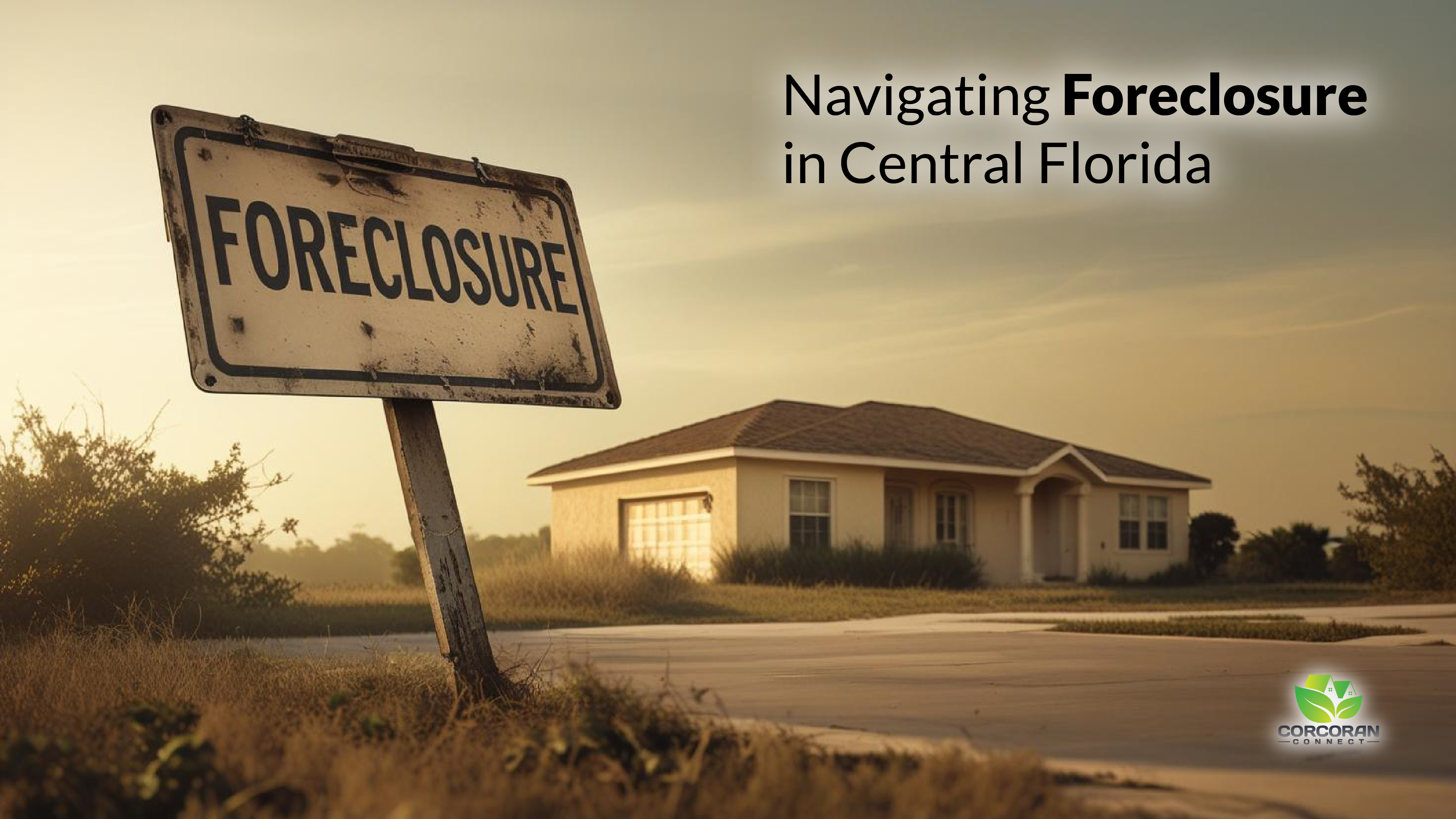🏡 Navigating Foreclosure in Central Florida: Your Real Estate Concierge Guide 🔑

🏡 Navigating Foreclosure in Central Florida: Your Real Estate Concierge Guide 🔑
Welcome to the Corcoran Connect blog, your trusted resource for Central Florida real estate. We are Corcoran Connect, your real estate concierge, and we offer expert insights to help you navigate the market. Today, we’re addressing a topic that requires careful consideration: foreclosure. While the term can be intimidating, understanding the process and your options is crucial for both homeowners and potential buyers. Our goal is to provide a comprehensive guide to empower you with knowledge and help you make the best decision for your situation.
For Central Florida Homeowners: Facing Foreclosure with a Strategy 🤔
If you're a homeowner struggling with mortgage payments, the first and most critical step is to act quickly. In Florida, the foreclosure process is "judicial," meaning it goes through the court system, and this can take many months. This window of time is a valuable opportunity to explore your options and prevent the foreclosure from being finalized. Don't wait until the last minute—the earlier you seek help, the more solutions are available to you.
The Florida Foreclosure Process: What to Expect
- Notice of Default: After you miss a few payments, your lender will send you a notice of default. This letter typically gives you 30-90 days to bring your payments current before they initiate a lawsuit.
- Lawsuit: If you don't respond or resolve the issue, the lender files a lawsuit in state court. You will be served with a summons and have 20 days to file a response. Ignoring this summons is the worst thing you can do, as it will lead to a default judgment against you.
- Judicial Sale: Once the court rules in favor of the lender, a public auction date will be set. The property will be sold to the highest bidder, and you will be required to vacate the home.
Options to Explore Before Foreclosure:
- Loan Modification: This is a popular option where your lender agrees to permanently change the terms of your loan. This could include lowering the interest rate, extending the loan term, or even forgiving a portion of the principal.
- Forbearance Agreement: Your lender may offer a temporary pause or reduction in your mortgage payments. This is a short-term solution designed to give you time to get back on your feet.
- Selling Your Home: Selling your home in "pre-foreclosure" is often the most beneficial option. It allows you to control the sale, pay off your mortgage, avoid a foreclosure mark on your credit report, and potentially walk away with any remaining equity.
- Short Sale: If your home's value is less than what you owe, your lender may agree to a short sale. In this scenario, they accept a sale price that is "short" of the full mortgage amount, releasing you from the debt.
- Deed-in-Lieu of Foreclosure: This option involves you voluntarily giving the property deed back to the lender in exchange for being released from your mortgage obligation. It avoids the public sale but will still negatively impact your credit.
The Importance of Professional Guidance and Resources: Navigating these options can be complex. We strongly advise speaking with a housing counselor or a real estate professional who specializes in these situations. The U.S. Department of Housing and Urban Development (HUD) provides free or low-cost housing counseling. You can find a HUD-approved counselor near you by calling (800) 569-4287.
For Buyers: The Opportunities and Risks of Foreclosure Properties 💰
For homebuyers, foreclosure properties can be a source of great deals, but they are not without risk. In the Central Florida market, you'll encounter two main types:
- Auction Properties: These homes are sold at a public auction, typically hosted online by the county. Buyers must be prepared to pay in cash, often in full, on the same day. The biggest risk is that you cannot inspect the property beforehand. You are also responsible for any outstanding liens, code violations, or even evicting a current occupant.
- Bank-Owned (REO) Properties: If a property fails to sell at auction, the bank takes ownership and lists it as a Real Estate Owned (REO) property. These homes are listed on the MLS, making them accessible to buyers with traditional financing. While they are still sold "as-is," buyers are typically allowed to get a home inspection and a title search.
Tips for Buying a Foreclosure in Central Florida:
- Work with an Experienced Agent: An agent specializing in Central Florida foreclosure properties is an essential part of your team. They can help you identify opportunities, understand the unique paperwork involved, and provide a realistic assessment of the home's potential value and risks.
- Secure Your Finances: Whether you need cash for an auction or a pre-approval for an REO, having your finances in order is key to making a competitive offer.
- Do Your Due Diligence: While some properties can't be inspected, for REO homes, never skip this step. A thorough home inspection will uncover hidden issues and help you budget for necessary repairs.
Corcoran Connect is Here to Help! 🤝
No matter which side of the foreclosure process you're on, having a trusted partner is essential. As your real estate concierge, our team provides the expert guidance and compassionate support you need. We can help sellers explore every option to avoid foreclosure and assist buyers in finding and navigating the purchase of a foreclosure property.
Contact us today for a confidential discussion about your situation.
📞 Phone: 1-844-CORCORAN or 407-953-9118
📧 Email: info@corcoranconnect.com

